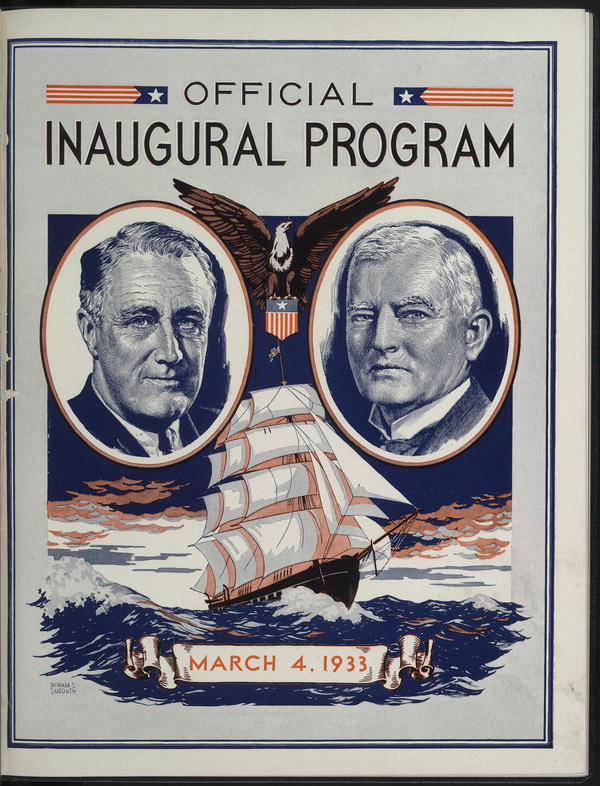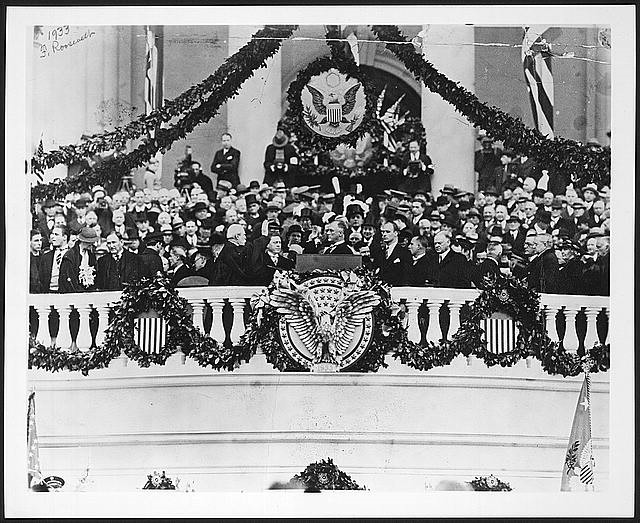Published: March 3, 2023
In 1932, Franklin D. Roosevelt defeated Herbert Hoover in a landslide and would go on to be elected three more times as president.  His first inauguration took place ninety years ago, on March 4th, 1933, during the Great Depression. Roosevelt inherited a country in turmoil, whose citizens had lost faith in financial and political institutions. He offered comfort in his words, and he backed his words with action.
His first inauguration took place ninety years ago, on March 4th, 1933, during the Great Depression. Roosevelt inherited a country in turmoil, whose citizens had lost faith in financial and political institutions. He offered comfort in his words, and he backed his words with action.
Roosevelt began his inaugural address that day with his now famous phrase, “the only thing we have to fear is fear itself,” and urged Americans not to give into despair. He contextualized the issue as a material problem, not a hopeless one, something they could fix. By evoking images of the pioneer spirit, the founding fathers, and the Constitution, Roosevelt appealed to the patriotic side of the citizens before declaring war on the Great Depression.
“The task can be helped by definite efforts to raise the values of agricultural products and, with this, the power to purchase the output of our cities. It can be helped by preventing realistically the tragedy of the growing loss through foreclosure of our small homes and our farms… It can be helped by the unifying of relief activities which today are often scattered, uneconomical, and unequal. It can be helped by national planning for and supervision of all forms of transportation and of communications and other utilities which have a definitely public character. There are many ways in which it can be helped, but it can never be helped merely by talking about it. We must act and act quickly.
Finally, in our progress toward a resumption of work, we require two safeguards against a return of the evils of the old order; there must be a strict supervision of all banking and credits and investments; there must be an end to speculation with other people's money, and there must be provision for an adequate but sound currency.”
Chief Justice Charles Evans Hughes administering the oath of office to Franklin Delano Roosevelt on the east portico of the U.S. Capitol, March 4, 1933. Source: Library of Congress.
The following is a brief list of accomplishments during Roosevelt’s first year:
- The Banking Act of 1933 aimed to restore the U.S. public’s confidence in the banking system. It established the Federal Deposit Insurance Corporation (FDIC), which extended federal oversight to commercial banks, and provided deposit insurance to banks (FDIC ). The Banking Act of 1933 and the establishment of the FDIC have since been updated and incorporated in U.S.C. Title 12, Chapter 3, Subchapter 1, Section 227, “The Banking Act of 1933”, and U.S.C. Title 12, Chapter 16, Section 1811, “The Federal Deposit Insurance Corporation”, respectively.
- The Farm Credit Act of 1933 placed all existing agricultural credit organizations under the supervision of a new agency, the Farm Credit Administration (FCA). The Emergency Farm Mortgage Act of 1933 aimed to help farmers facing foreclosures refinance their mortgages (FCA ). The Farm Credit Act has since been updated and incorporated in U.S.C. Title 12, Chapter 23, “The Farm Credit System”.
- The Federal Surplus Relief Corporation (FSRC), another alphabet agency from the New Deal, diverted agricultural surplus to relief organizations (U.S. Department of Agriculture ). The establishment of the Federal Surplus Relief Corporation has since been updated and incorporated in U.S.C. Title 7, Chapter 26, Subchapter 3, Section 612c, “Appropriation to encourage exportation and domestic consumption of agricultural products”.
- The Civilian Conservation Corps (CCC), a work relief program to curtail unemployment, provided young, single men with jobs. The men of the CCC, about 3 million, improved America’s public lands, forests, and parks (NPS ). The establishment of the CCC has since been updated and incorporated in U.S.C. Title 16, Chapter 3A, Subchapter 1, “Civilian Conservation Corps”.
Roosevelt’s administration created many more programs as part of The New Deal, which helped millions of people around the country.
Did You Know?
Roosevelt was the last president whose inauguration took place in March. On January 23, 1933, after being ratified by three-fourths of the states, the Twentieth Amendment became part of the U.S. Constitution. The Amendment changed when the Presidential and Congressional terms began, pushing back future inaugurations from March to January.
"SECTION 1. The terms of the President and Vice President shall end at noon on the 20th day of January, and the terms of the Senators and Representatives at noon on the 3d day of January of the years in which such terms would have ended if this article had not been ratified, and the terms of their successors shall then begin.”
News about who won the election used to take considerable time to reach the whole country. Moving to the capital was arduous and time-consuming, depending on where the president-elect lived. With the advent of telephones and telegrams, as well as fast, efficient transportation, it was not necessary to wait so long for the president-elect to begin their term; consequentially, it shortened the lame duck period of the former president.
Related Publications
- Banking Act of 1933* – To provide for the safer and more effective use of the assets of banks, to regulate interbank control, to prevent the undue diversion of funds into speculative operations, and for other purposes.
- 77 Congressional Record (Bound) – House of Representatives: May 31, 1933 – When the Farm Credit Act of 1933 was discussed in Congress.
Other Resources
- Learn more about Franklin Roosevelt’s Inaugural Address from the National Archives website.
- Read Chronicling America’s guide to the Dust Bowl from the Library of Congress.
- Search the Library of Congress’ Prints and Photographs Online Catalog to view pictures from Roosevelt’s Inauguration and the Great Depression .
- Search GPO’s the Catalog of U.S. Government Publications (CGP) to find more publications related to The New Deal. The CGP is the finding tool for Federal publications that includes descriptive information for historical and current publications as well as direct links to the full documents when available.
*This links to a Statute Compilation, which is a compilation of the public law, as amended, and is an unofficial document and should not be cited as legal evidence of the law. Learn more.
